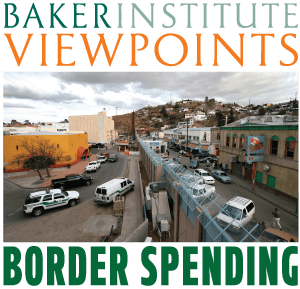Border security and (mis-)management
In the first of a six-part Baker Institute Viewpoints series, experts respond to the question: What are the implications of expanding border security?
The immigration bill recently passed in the Senate assigns nearly $50 billion to increase border security – a border “surge.” This unprecedented deployment of resources includes 20,000 additional Border Patrol agents; new technology such as drones, sensors and cameras; and hundreds of miles of wall along the border. Proponents reason that the border surge will bring order to the region and stem the flow of undocumented immigrants into the United States. However, this expenditure could lead to multiple unintended consequences that should give pause to anyone considering it. Continue Reading

